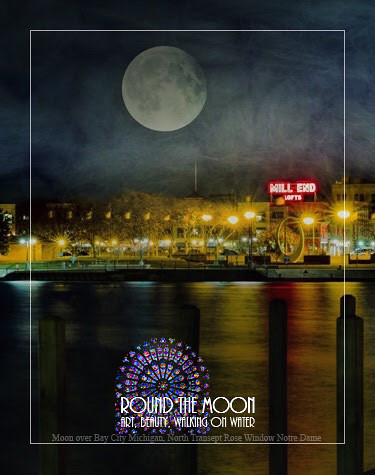
Volume XV, Issue III
The Bethlehem Steel Story
Builder of America's Buildings, Ships and Bridges
Afternoon in Times Square
Photo by Savhanna Herndon
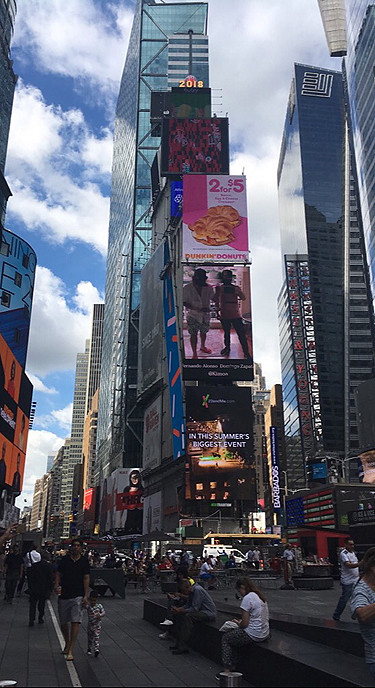
Savhanna Herndon recently visited New York and we will feature some of her photos in upcoming issues.
Tree at Blackrock Springs
Photos by Bob Kirchman
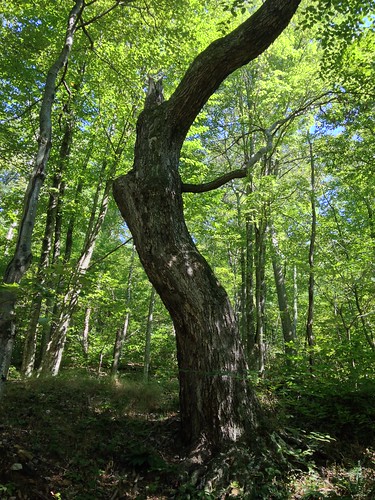
Photo by Bob Kirchman.
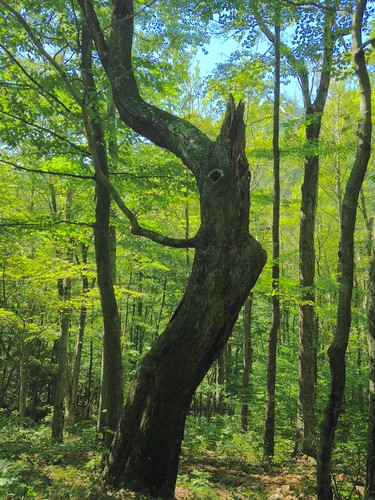
Photo by Bob Kirchman.
Looking for Artist
Who Can Walk on Water
The most creative job in the world involves fashion, decorating, recreation, education, transportation, psychology, romance, cuisine, literature, art, economics, government, pediatrics, geriatrics, entertainment, maintenance, purchasing, law, religion, energy and management. Anyone who can handle all of these has to be somebody special. She is. She’s a homemaker.” – Richard Kerr
If the work comes to the artist and says, 'Here I am, serve me,' then the job of the artist, great or small, is to serve. The amount of the artist's talent is not what it is about. Jean Rhys said to an interviewer in the Paris Review, 'Listen to me. All of writing is a huge lake. There are great rivers that feed the lake, like Tolstoy and Dostoyevsky. And there are mere trickles, like Jean Rhys. All that matters is feeding the lake. I don't matter. The lake matters. You must keep feeding the lake'.” ― Madeleine L'Engle, Walking on Water: Reflections on Faith and Art
Somewhere in my past, I owned a book of Nineteenth Century industrial illustrations. They were beautiful. Of note were the obvious details of pure ornamentation that the designers sought to put into their work. There was a sense that there was wonder to be unfolded in the inventions so delineated. Design seems to have moved sharply away from the hand-rendered transcendence of that period to a more machine-based process. There is a beautiful quality to much of that as well, but there is less direct touch to paper and process. I miss that. Still, there is a place for Divine Design. Richard Kerr’s homemaker embodies the practice of creativity. Many building designers are quite adept at assembling elements and organizing spaces on their screens, but where once they would have had creative interaction with the renderer, the press of a few buttons and the arc of the mouse take them to the visualization of their work.
This week I started to re-read Madeline L’Engle’s Walking on Water: Reflections on Faith and Art. [1.] Not far into this fine little book one encounters the topic of obedience. L’engle puts it this way: A work of art, be it a painting, a book, or any other work, comes to the artist and says: “Here I am, Enflesh me. Give Birth to me.” The artist is faced with a choice. She may respond as Mary: “My soul doth magnify the Lord,” or she may refuse. The decision is not necessarily a conscious one. And so, as I continue to provide old-fashioned visualization for a few clients, I see the work there dwindling. Yet I am not yet ready to give up serving. There is still work to be done. For the past months, I have taught drawing and painting to a young high school student who is home schooled. There is Divine purpose there. Now the invitation has been extended to teach a unit in the home school coop. It seems the Divine mission is thus: to inspire a new generation to infuse their life in this world with the stuff that Kerr talks about. Divine mission, a Sacred trust, an invitation to join the Master in His finest work. I find myself enthused.
In a very real sense not one of us is qualified, but it seems that God continually chooses the most unqualified to do his work, to bear his glory. If we are qualified, we tend to think that we have done the job ourselves. If we are forced to accept our evident lack of qualification, then there's no danger that we will confuse God's work with our own, or God's glory with our own.” -- Madeleine L'Engle, Walking on Water: Reflections on Faith and Art
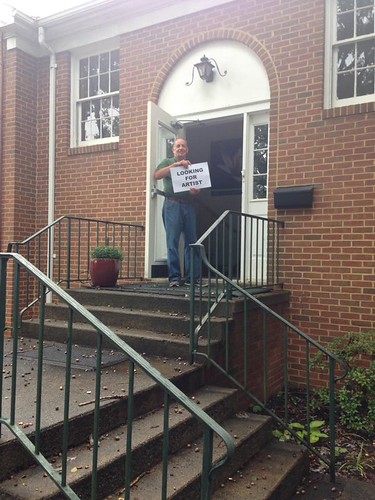
Looking for artist... Photo by Kristina Elaine Greer.

...who can walk on water! Photo by Kristina Elaine Greer.
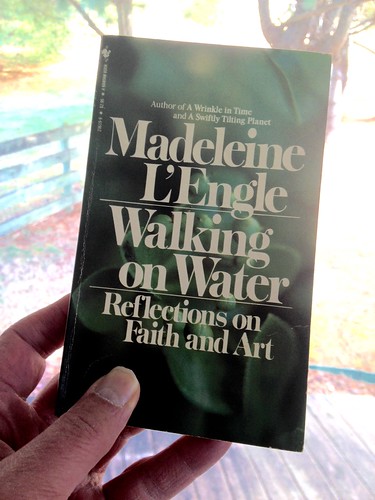
All children are artists, and it is an indictment of our culture that so many of them lose their creativity, their unfettered imaginations, as they grow older. But they start off without self-consciousness as they paint their purple flowers, their anatomically impossible people, their thunderous, sulphurous skies. They don’t worry that they may not be as good as Di Chirico or Bracque; they know intuitively that it is folly to make comparisons, and they go ahead and say what they want to say. What looks like a hat to a grownup may, to the child artist, be an elephant inside a boa constrictor.
So what happens? Why do we lose our wonderful, rackety creativity? What corrupts us?
Corrupt: another unpopular word; another important one. It’s importance first struck me when I was reading Thomas Traherne, one of my favorite seventeenth century poets and mystics. “Certainly Adam and Eve in Paradise had not more sweete and curious apprehensions of the world than when I was a child,” he wrote. Everything was new and delightful for him. The rosy glow of sunrise had in it the flaming glory of creation. The stars at night were a living, heavenly dance. He listened to the grass growing, smelled the west wind, tasted the rain, touched the grains of sand on the shore. All hi senses, his mind, his heart, were alive and in touch with being. “So that,” Trahane adds sadly, “without much ado I as corrupted, and made to learn the dirty devices of this world, which now I unlearn, and become as a little child again, that I may enter into the Kingdom of God.”
A lot of my adult life has been spent in trying to overcome this corruption, in unlearning the dirty devices of this world, which would dull our imaginations, cut away our creativity. So it is only with the conscious-unselfconsciousness of a child that I can think about theories of asthetics, of art, particularly as these touch upon my questions about life and love and God.” -- Madeleine L'Engle, Walking on Water: Reflections on Faith and Art
Il est très simple: on ne voit bien qu'avec le cœur. L'essentiel est invisible pour les yeux."
-- Antoin de St Exupery
Higher Calling
Thought from George MacDonald

Pink Ladyslipper at White Rock Falls. Photo by Bob Kirchman
If, instead of a gem or even a flower, we could cast the gift of a lovely thought into the heart of a friend, that would be giving as the angels give."
- George Macdonald
A Gift of Beauty
Warnie's Box

This absence of beauty, now that I come to think of it, is characteristic of our childhood. No picture on the walls of my father's house ever attracted — and indeed none deserved — our attention. We never saw a beautiful building nor imagined that a building could be beautiful. My earliest aesthetic experiences, if indeed they were aesthetic, were not of that kind; they were already incurably romantic, not formal. Once in those very early days my brother brought into the nursery the lid of a biscuit tin which he had covered with moss and garnished with twigs and flowers so as to make it a toy garden or a toy forest.
That was the first beauty I ever knew.
What the real garden had failed to do, the toy garden did. It made me aware of nature — not, indeed, as a storehouse of forms and colours but as something cool, dewy, fresh, exuberant. I do not think the impression was very important at the moment, but it soon became important in memory. As long as I live my imagination of Paradise will retain something of my brother's toy garden."
-- C. S. Lewis, Surprised by Joy [ 2.]
Fixing the Escalator
[click to read]
by Nicholas N. Eberstadt
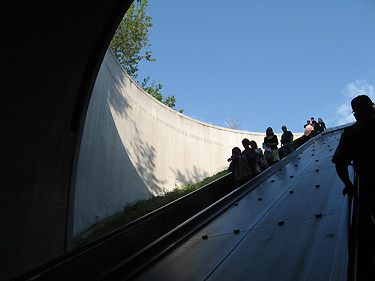
Metro Escalator, Washington, DC. Photo by Bob Kirchman
The abstraction of “inequality” doesn’t matter a lot to ordinary Americans. The reality of economic insecurity does. [3.] The Great American Escalator is broken—and it badly needs to be fixed. With the election of 2016, Americans within the bubble finally learned that the 21st century has gotten off to a very bad start in America. Welcome to the reality. We have a lot of work to do together to turn this around. (read more)
Looking for Creative Solutionists
By Bob Kirchman
Awareness of a problem is only the beginning. What if Divine Inspiration is available to lead us to new and innovative answers to human problems? It has happened in centuries past and I firmly believe it is within our grasp now.
Poll any group of young people today and you will find a degree of pessimism about the future. As the economy faltered, ‘experts’ essentially told them: “Welcome to the new normal.” But history tells us that economies are not a zero-sum game… one where someone must lose for another to win. New invention has lifted entire societies in the past and I believe it can do so again. Consider the case of Nineteenth Century England. We all know that William Wilberforce [4.] performed a great and noble work when he won the abolition of slavery, but did you know that that devastated the economy of Bristol, England’s chief slave port. Fortunes were lost. Men committed suicide. Children were cast out onto the street. Bristol’s children faced a dismal ‘new normal’ indeed.
But a young minister from Prussia came to Bristol as a missionary. George Müller [5.] saw Bristol’s street urchins as jewels to be polished. He built five large houses at Ashley Downs to care for orphans, trusting the Divine for provision. He cared for 10,024 orphan children in the course of his life, instructing the boys in trades and the ladies for work as teachers, nurses and housekeepers. He was excoriated by the ‘experts’ for training these young people ‘above their station.’ He ignored the experts. He established 117 schools which offered Christian education to over 120,000 children. But what future would there be for them?
Pastor Tim Keller calls economic development a Deaconate Ministry. To be sure the church does this work when it sends treadle sewing machines to Zambia, so that widowed ladies may become tailors. But it is also needed in the developed world. Sometimes the instrument of Divine blessing may not even know that they are. Consider the case of Isambard Kingdom Brunel, Britain’s Nineteenth Century Bridge Builder. [6.] He came to Bristol to build a suspension bridge and ended up building the Great Western Railroad, which revitalized Bristol’s economy! Brunel also designed great ships to connect Britain with the Americas, making cotton cheap and plentiful. The offshoot of this and modern textile manufacturing was that poor as well as rich could afford quality garments.
It was suggested in the Nineteenth Century that the United States Patent Office could be shut down because “everything that is going to be invented has already been invented!” Well, the truth was that much of the visionary technology depicted in Jules Verne’s Voyages Extraordinaire would not be perfected until the Twentieth Century. Only time will tell what wonders the Divine might inspire in the decades to come, but if history is any indicator, there is much to be hopeful for!
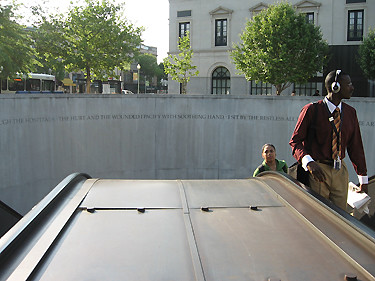
Metro Escalator, Washington, DC. Photo by Bob Kirchman
Round the Moon
By Jules Verne
CHAPTER VI, QUESTION AND ANSWER
On the 4th of December, when the travelers awoke after fifty-four hours' journey, the chronometer marked five o'clock of the terrestrial morning. In time it was just over five hours and forty minutes, half of that assigned to their sojourn in the projectile; but they had already accomplished nearly seven-tenths of the way. This peculiarity was due to their regularly decreasing speed.
Now when they observed the earth through the lower window, it looked like nothing more than a dark spot, drowned in the solar rays. No more crescent, no more cloudy light! The next day, at midnight, the earth would be new, at the very moment when the moon would be full. Above, the orb of night was nearing the line followed by the projectile, so as to meet it at the given hour. All around the black vault was studded with brilliant points, which seemed to move slowly; but, at the great distance they were from them, their relative size did not seem to change. The sun and stars appeared exactly as they do to us upon earth. As to the moon, she was considerably larger; but the travelers' glasses, not very powerful, did not allow them as yet to make any useful observations upon her surface, or reconnoiter her topographically or geologically.
Thus the time passed in never-ending conversations all about the moon. Each one brought forward his own contingent of particular facts; Barbicane and Nicholl always serious, Michel Ardan always enthusiastic.
The projectile, its situation, its direction, incidents which might happen, the precautions necessitated by their fall on to the moon, were inexhaustible matters of conjecture.
As they were breakfasting, a question of Michel's, relating to the projectile, provoked rather a curious answer from Barbicane, which is worth repeating. Michel, supposing it to be roughly stopped, while still under its formidable initial speed, wished to know what the consequences of the stoppage would have been.
But," said Barbicane, "I do not see how it could have been stopped."
But let us suppose so," said Michel.
It is an impossible supposition," said the practical Barbicane; "unless that impulsive force had failed; but even then its speed would diminish by degrees, and it would not have stopped suddenly." "Admit that it had struck a body in space."
What body?" "Why that enormous meteor which we met."
Then," said Nicholl, "the projectile would have been broken into a thousand pieces, and we with it."
More than that," replied Barbicane; "we should have been burned to death."
Burned?" exclaimed Michel, "by Jove! I am sorry it did not happen, `just to see.'"
And you would have seen," replied Barbicane. "It is known now that heat is only a modification of motion. When water is warmed-- that is to say, when heat is added to it--its particles are set in motion."
Well," said Michel, "that is an ingenious theory!"
And a true one, my worthy friend; for it explains every phenomenon of caloric. Heat is but the motion of atoms, a simple oscillation of the particles of a body. When they apply the brake to a train, the train comes to a stop; but what becomes of the motion which it had previously possessed? It is transformed into heat, and the brake becomes hot. Why do they grease the axles of the wheels? To prevent their heating, because this heat would be generated by the motion which is thus lost by transformation."
Yes, I understand," replied Michel, "perfectly. For example, when I have run a long time, when I am swimming, when I am perspiring in large drops, why am I obliged to stop? Simply because my motion is changed into heat." Barbicane could not help smiling at Michel's reply; then, returning to his theory, said:
Thus, in case of a shock, it would have been with our projectile as with a ball which falls in a burning state after having struck the metal plate; it is its motion which is turned into heat. Consequently I affirm that, if our projectile had struck the meteor, its speed thus suddenly checked would have raised a heat great enough to turn it into vapor instantaneously."
Then," asked Nicholl, "what would happen if the earth's motion were to stop suddenly?"
Her temperature would be raised to such a pitch," said Barbicane, "that she would be at once reduced to vapor."
Well," said Michel, "that is a way of ending the earth which will greatly simplify things."
And if the earth fell upon the sun?" asked Nicholl.
According to calculation," replied Barbicane, "the fall would develop a heat equal to that produced by 16,000 globes of coal, each equal in bulk to our terrestrial globe."
Good additional heat for the sun," replied Michel Ardan, "of which the inhabitants of Uranus or Neptune would doubtless not complain; they must be perished with cold on their planets."
Thus, my friends," said Barbicane, "all motion suddenly stopped produces heat. And this theory allows us to infer that the heat of the solar disc is fed by a hail of meteors falling incessantly on its surface. They have even calculated----"
Oh, dear!" murmured Michel, "the figures are coming."
They have even calculated," continued the imperturbable Barbicane, "that the shock of each meteor on the sun ought to produce a heat equal to that of 4,000 masses of coal of an equal bulk."
And what is the solar heat?" asked Michel.
It is equal to that produced by the combustion of a stratum of coal surrounding the sun to a depth of forty-seven miles." "And that heat----"
Would be able to boil two billions nine hundred millions of cubic myriameters [2] of water."
[2] The myriameter is equal to rather more than 10,936 cubic yards English.
And it does not roast us!" exclaimed Michel.
No," replied Barbicane, "because the terrestrial atmosphere absorbs four-tenths of the solar heat; besides, the quantity of heat intercepted by the earth is but a billionth part of the entire radiation."
I see that all is for the best," said Michel, "and that this atmosphere is a useful invention; for it not only allows us to breathe, but it prevents us from roasting."
Yes!" said Nicholl, "unfortunately, it will not be the same in the moon."
Bah!" said Michel, always hopeful. "If there are inhabitants, they must breathe. If there are no longer any, they must have left enough oxygen for three people, if only at the bottom of ravines, where its own weight will cause it to accumulate, and we will not climb the mountains; that is all." And Michel, rising, went to look at the lunar disc, which shone with intolerable brilliancy.
By Jove!" said he, "it must be hot up there!"
Without considering," replied Nicholl, "that the day lasts 360 hours!"
And to compensate that," said Barbicane, "the nights have the same length; and as heat is restored by radiation, their temperature can only be that of the planetary space."
A pretty country, that!" exclaimed Michel. "Never mind! I wish I was there! Ah! my dear comrades, it will be rather curious to have the earth for our moon, to see it rise on the horizon, to recognize the shape of its continents, and to say to oneself, `There is America, there is Europe;' then to follow it when it is about to lose itself in the sun's rays! By the bye, Barbicane, have the Selenites eclipses?"
Yes, eclipses of the sun," replied Barbicane, "when the centers of the three orbs are on a line, the earth being in the middle. But they are only partial, during which the earth, cast like a screen upon the solar disc, allows the greater portion to be seen."
And why," asked Nicholl, "is there no total eclipse? Does not the cone of the shadow cast by the earth extend beyond the moon?"
Yes, if we do not take into consideration the refraction produced by the terrestrial atmosphere. No, if we take that refraction into consideration. Thus letbe the horizontal parallel, and p the apparent semidiameter----"
Oh!" said Michel. "Do speak plainly, you man of algebra!"
Very well," replied Barbicane; "in popular language the mean distance from the moon to the earth being sixty terrestrial radii, the length of the cone of the shadow, on account of refraction, is reduced to less than forty-two radii. The result is that when there are eclipses, the moon finds itself beyond the cone of pure shadow, and that the sun sends her its rays, not only from its edges, but also from its center."
Then," said Michel, in a merry tone, "why are there eclipses, when there ought not to be any?"
Simply because the solar rays are weakened by this refraction, and the atmosphere through which they pass extinguished the greater part of them!"
That reason satisfies me," replied Michel. "Besides we shall see when we get there. Now, tell me, Barbicane, do you believe that the moon is an old comet?"
There's an idea!"
Yes," replied Michel, with an amiable swagger, "I have a few ideas of that sort."
But that idea does not spring from Michel," answered Nicholl.
Well, then, I am a plagiarist."
No doubt about it. According to the ancients, the Arcadians pretend that their ancestors inhabited the earth before the moon became her satellite. Starting from this fact, some scientific men have seen in the moon a comet whose orbit will one day bring it so near to the earth that it will be held there by its attraction."
Is there any truth in this hypothesis?" asked Michel. "None whatever," said Barbicane, "and the proof is, that the moon has preserved no trace of the gaseous envelope which always accompanies comets."
But," continued Nicholl, "Before becoming the earth's satellite, could not the moon, when in her perihelion, pass so near the sun as by evaporation to get rid of all those gaseous substances?"
It is possible, friend Nicholl, but not probable."
Why not?"
Because-- Faith I do not know."
Ah!" exclaimed Michel, "what hundred of volumes we might make of all that we do not know!"
Ah! indeed."
What time is it?" asked Barbicane.
Three o'clock," answered Nicholl.
How time goes," said Michel, "in the conversation of scientific men such as we are! Certainly, I feel I know too much! I feel that I am becoming a well!"
Saying which, Michel hoisted himself to the roof of the projectile, "to observe the moon better," he pretended. During this time his companions were watching through the lower glass. Nothing new to note!
When Michel Ardan came down, he went to the side scuttle; and suddenly they heard an exclamation of surprise!
What is it?" asked Barbicane.
The president approached the window, and saw a sort of flattened sack floating some yards from the projectile. This object seemed as motionless as the projectile, and was consequently animated with the same ascending movement. "What is that machine?" continued Michel Ardan. "Is it one of the bodies which our projectile keeps within its attraction, and which will accompany it to the moon?"
What astonishes me," said Nicholl, "is that the specific weight of the body, which is certainly less than that of the projectile, allows it to keep so perfectly on a level with it."
Nicholl," replied Barbicane, after a moment's reflection, "I do not know what the object it, but I do know why it maintains our level."
And why?"
Because we are floating in space, my dear captain, and in space bodies fall or move (which is the same thing) with equal speed whatever be their weight or form; it is the air, which by its resistance creates these differences in weight. When you create a vacuum in a tube, the objects you send through it, grains of dust or grains of lead, fall with the same rapidity. Here in space is the same cause and the same effect."
Just so," said Nicholl, "and everything we throw out of the projectile will accompany it until it reaches the moon."
Ah! fools that we are!" exclaimed Michel.
Why that expletive?" asked Barbicane.
Because we might have filled the projectile with useful objects, books, instruments, tools, etc. We could have thrown them all out, and all would have followed in our train. But happy thought! Why cannot we walk outside like the meteor? Why cannot we launch into space through the scuttle? What enjoyment it would be to feel oneself thus suspended in ether, more favored than the birds who must use their wings to keep themselves up!"
Granted," said Barbicane, "but how to breathe?"
Hang the air, to fail so inopportunely!"
But if it did not fail, Michel, your density being less than that of the projectile, you would soon be left behind."
Then we must remain in our car?"
We must!"
Ah!" exclaimed Michel, in a load voice.
What is the matter," asked Nicholl.
I know, I guess, what this pretended meteor is! It is no asteroid which is accompanying us! It is not a piece of a planet."
What is it then?" asked Barbicane.
It is our unfortunate dog! It is Diana's husband!"
Indeed, this deformed, unrecognizable object, reduced to nothing, was the body of Satellite, flattened like a bagpipe without wind, and ever mounting, mounting!
CHAPTER VII, A MOMENT OF INTOXICATION
Thus a phenomenon, curious but explicable, was happening under these strange conditions.
Every object thrown from the projectile would follow the same course and never stop until it did. There was a subject for conversation which the whole evening could not exhaust.
Besides, the excitement of the three travelers increased as they drew near the end of their journey. They expected unforseen incidents, and new phenomena; and nothing would have astonished them in the frame of mind they then were in. Their overexcited imagination went faster than the projectile, whose speed was evidently diminishing, though insensibly to themselves. But the moon grew larger to their eyes, and they fancied if they stretched out their hands they could seize it.
The next day, the 5th of November, at five in the morning, all three were on foot. That day was to be the last of their journey, if all calculations were true.
That very night, at twelve o'clock, in eighteen hours, exactly at the full moon, they would reach its brilliant disc. The next midnight would see that journey ended, the most extraordinary of ancient or modern times. Thus from the first of the morning, through the scuttles silvered by its rays, they saluted the orb of night with a confident and joyous hurrah.
The moon was advancing majestically along the starry firmament. A few more degrees, and she would reach the exact point where her meeting with the projectile was to take place.
According to his own observations, Barbicane reckoned that they would land on her northern hemisphere, where stretch immense plains, and where mountains are rare. A favorable circumstance if, as they thought, the lunar atmosphere was stored only in its depths.
Besides," observed Michel Ardan, "a plain is easier to disembark upon than a mountain. A Selenite, deposited in Europe on the summit of Mont Blanc, or in Asia on the top of the Himalayas, would not be quite in the right place."
And," added Captain Nicholl, "on a flat ground, the projectile will remain motionless when it has once touched; whereas on a declivity it would roll like an avalanche, and not being squirrels we should not come out safe and sound. So it is all for the best."
Indeed, the success of the audacious attempt no longer appeared doubtful. But Barbicane was preoccupied with one thought; but not wishing to make his companions uneasy, he kept silence on this subject.
The direction the projectile was taking toward the moon's northern hemisphere, showed that her course had been slightly altered. The discharge, mathematically calculated, would carry the projectile to the very center of the lunar disc. If it did not land there, there must have been some deviation. What had caused it? Barbicane could neither imagine nor determine the importance of the deviation, for there were no points to go by.
He hoped, however, that it would have no other result than that of bringing them nearer the upper border of the moon, a region more suitable for landing.
Without imparting his uneasiness to his companions, Barbicane contented himself with constantly observing the moon, in order to see whether the course of the projectile would not be altered; for the situation would have been terrible if it failed in its aim, and being carried beyond the disc should be launched into interplanetary space. At that moment, the moon, instead of appearing flat like a disc, showed its convexity. If the sun's rays had struck it obliquely, the shadow thrown would have brought out the high mountains, which would have been clearly detached. The eye might have gazed into the crater's gaping abysses, and followed the capricious fissures which wound through the immense plains. But all relief was as yet leveled in intense brilliancy. They could scarcely distinguish those large spots which give the moon the appearance of a human face.
Face, indeed!" said Michel Ardan; "but I am sorry for the amiable sister of Apollo. A very pitted face!"
But the travelers, now so near the end, were incessantly observing this new world. They imagined themselves walking through its unknown countries, climbing its highest peaks, descending into its lowest depths. Here and there they fancied they saw vast seas, scarcely kept together under so rarefied an atmosphere, and water-courses emptying the mountain tributaries. Leaning over the abyss, they hoped to catch some sounds from that orb forever mute in the solitude of space. That last day left them.
They took down the most trifling details. A vague uneasiness took possession of them as they neared the end. This uneasiness would have been doubled had they felt how their speed had decreased. It would have seemed to them quite insufficient to carry them to the end. It was because the projectile then "weighed" almost nothing. Its weight was ever decreasing, and would be entirely annihilated on that line where the lunar and terrestrial attractions would neutralize each other.
But in spite of his preoccupation, Michel Ardan did not forget to prepare the morning repast with his accustomed punctuality. They ate with a good appetite. Nothing was so excellent as the soup liquefied by the heat of the gas; nothing better than the preserved meat. Some glasses of good French wine crowned the repast, causing Michel Ardan to remark that the lunar vines, warmed by that ardent sun, ought to distill even more generous wines; that is, if they existed. In any case, the far-seeing Frenchman had taken care not to forget in his collection some precious cuttings of the Medoc and Cote d'Or, upon which he founded his hopes.
Reiset and Regnaut's apparatus worked with great regularity. Not an atom of carbonic acid resisted the potash; and as to the oxygen, Captain Nicholl said "it was of the first quality." The little watery vapor enclosed in the projectile mixing with the air tempered the dryness; and many apartments in London, Paris, or New York, and many theaters, were certainly not in such a healthy condition.
But that it might act with regularity, the apparatus must be kept in perfect order; so each morning Michel visited the escape regulators, tried the taps, and regulated the heat of the gas by the pyrometer. Everything had gone well up to that time, and the travelers, imitating the worthy Joseph T. Maston, began to acquire a degree of embonpoint which would have rendered them unrecognizable if their imprisonment had been prolonged to some months. In a word, they behaved like chickens in a coop; they were getting fat.
In looking through the scuttle Barbicane saw the specter of the dog, and other divers objects which had been thrown from the projectile, obstinately following them. Diana howled lugubriously on seeing the remains of Satellite, which seemed as motionless as if they reposed on solid earth.
Do you know, my friends," said Michel Ardan, "that if one of us had succumbed to the shock consequent on departure, we should have had a great deal of trouble to bury him? What am I saying? to etherize him, as here ether takes the place of earth. You see the accusing body would have followed us into space like a remorse."
That would have been sad," said Nicholl.
Ah!" continued Michel, "what I regret is not being able to take a walk outside. What voluptuousness to float amid this radiant ether, to bathe oneself in it, to wrap oneself in the sun's pure rays. If Barbicane had only thought of furnishing us with a diving apparatus and an air-pump, I could have ventured out and assumed fanciful attitudes of feigned monsters on the top of the projectile."
Well, old Michel," replied Barbicane, "you would not have made a feigned monster long, for in spite of your diver's dress, swollen by the expansion of air within you, you would have burst like a shell, or rather like a balloon which has risen too high. So do not regret it, and do not forget this-- as long as we float in space, all sentimental walks beyond the projectile are forbidden."
Michel Ardan allowed himself to be convinced to a certain extent. He admitted that the thing was difficult but not impossible, a word which he never uttered.
The conversation passed from this subject to another, not failing him for an instant. It seemed to the three friends as though, under present conditions, ideas shot up in their brains as leaves shoot at the first warmth of spring. They felt bewildered. In the middle of the questions and answers which crossed each other, Nicholl put one question which did not find an immediate solution.
Ah, indeed!" said he; "it is all very well to go to the moon, but how to get back again?"
His two interlocutors looked surprised. One would have thought that this possibility now occurred to them for the first time.
What do you mean by that, Nicholl?" asked Barbicane gravely.
To ask for means to leave a country," added Michel, "When we have not yet arrived there, seems to me rather inopportune."
I do not say that, wishing to draw back," replied Nicholl; "but I repeat my question, and I ask, `How shall we return?'"
I know nothing about it," answered Barbicane.
And I," said Michel, "if I had known how to return, I would never have started."
There's an answer!" cried Nicholl.
I quite approve of Michel's words," said Barbicane; "and add, that the question has no real interest. Later, when we think it is advisable to return, we will take counsel together. If the Columbiad is not there, the projectile will be."
That is a step certainly. A ball without a gun!"
The gun," replied Barbicane, "can be manufactured. The powder can be made. Neither metals, saltpeter, nor coal can fail in the depths of the moon, and we need only go 8,000 leagues in order to fall upon the terrestrial globe by virtue of the mere laws of weight."
Enough," said Michel with animation. "Let it be no longer a question of returning: we have already entertained it too long. As to communicating with our former earthly colleagues, that will not be difficult."
And how?"
By means of meteors launched by lunar volcanoes."
Well thought of, Michel," said Barbicane in a convinced tone of voice. "Laplace has calculated that a force five times greater than that of our gun would suffice to send a meteor from the moon to the earth, and there is not one volcano which has not a greater power of propulsion than that."
Hurrah!" exclaimed Michel; "these meteors are handy postmen, and cost nothing. And how we shall be able to laugh at the post-office administration! But now I think of it----"
What do you think of?"
A capital idea. Why did we not fasten a thread to our projectile, and we could have exchanged telegrams with the earth?"
The deuce!" answered Nicholl. "Do you consider the weight of a thread 250,000 miles long nothing?"
As nothing. They could have trebled the Columbiad's charge; they could have quadrupled or quintupled it!" exclaimed Michel, with whom the verb took a higher intonation each time.
There is but one little objection to make to your proposition," replied Barbicane, "which is that, during the rotary motion of the globe, our thread would have wound itself round it like a chain on a capstan, and that it would inevitably have brought us to the ground."
By the thirty-nine stars of the Union!" said Michel, "I have nothing but impracticable ideas to-day; ideas worthy of J. T. Maston. But I have a notion that, if we do not return to earth, J. T. Maston will be able to come to us."
Yes, he'll come," replied Barbicane; "he is a worthy and a courageous comrade. Besides, what is easier? Is not the Columbiad still buried in the soil of Florida? Is cotton and nitric acid wanted wherewith to manufacture the pyroxyle? Will not the moon pass the zenith of Florida? In eighteen years' time will she not occupy exactly the same place as to-day?"
Yes," continued Michel, "yes, Maston will come, and with him our friends Elphinstone, Blomsberry, all the members of the Gun Club, and they will be well received. And by and by they will run trains of projectiles between the earth and the moon! Hurrah for J. T. Maston!"
It is probable that, if the Hon. J. T. Maston did not hear the hurrahs uttered in his honor, his ears at least tingled. What was he doing then? Doubtless, posted in the Rocky Mountains, at the station of Long's Peak, he was trying to find the invisible projectile gravitating in space. If he was thinking of his dear companions, we must allow that they were not far behind him; and that, under the influence of a strange excitement, they were devoting to him their best thoughts.
But whence this excitement, which was evidently growing upon the tenants of the projectile? Their sobriety could not be doubted. This strange irritation of the brain, must it be attributed to the peculiar circumstances under which they found themselves, to their proximity to the orb of night, from which only a few hours separated them, to some secret influence of the moon acting upon their nervous system? Their faces were as rosy as if they had been exposed to the roaring flames of an oven; their voices resounded in loud accents; their words escaped like a champagne cork driven out by carbonic acid; their gestures became annoying, they wanted so much room to perform them; and, strange to say, they none of them noticed this great tension of the mind.
Now," said Nicholl, in a short tone, "now that I do not know whether we shall ever return from the moon, I want to know what we are going to do there?"
What we are going to do there?" replied Barbicane, stamping with his foot as if he was in a fencing saloon; "I do not know."
You do not know!" exclaimed Michel, with a bellow which provoked a sonorous echo in the projectile.
No, I have not even thought about it," retorted Barbicane, in the same loud tone.
Well, I know," replied Michel.
Speak, then," cried Nicholl, who could no longer contain the growling of his voice.
I shall speak if it suits me," exclaimed Michel, seizing his companions' arms with violence.
It must suit you," said Barbicane, with an eye on fire and a threatening hand. "It was you who drew us into this frightful journey, and we want to know what for."
Yes," said the captain, "now that I do not know where I am going, I want to know why I am going."
Why?" exclaimed Michel, jumping a yard high, "why? To take possession of the moon in the name of the United States; to add a fortieth State to the Union; to colonize the lunar regions; to cultivate them, to people them, to transport thither all the prodigies of art, of science, and industry; to civilize the Selenites, unless they are more civilized than we are; and to constitute them a republic, if they are not already one!"
And if there are no Selenites?" retorted Nicholl, who, under the influence of this unaccountable intoxication, was very contradictory.
Who said that there were no Selenites?" exclaimed Michel in a threatening tone.
I do," howled Nicholl.
Captain," said Michel, "do not repreat that insolence, or I will knock your teeth down your throat!"
The two adversaries were going to fall upon each other, and the incoherent discussion threatened to merge into a fight, when Barbicane intervened with one bound.
Stop, miserable men," said he, separating his two companions; "if there are no Selenites, we will do without them."
Yes," exclaimed Michel, who was not particular; "yes, we will do without them. We have only to make Selenites. Down with the Selenites!"
The empire of the moon belongs to us," said Nicholl.
Let us three constitute the republic."
I will be the congress," cried Michel.
And I the senate," retorted Nicholl.
And Barbicane, the president," howled Michel.
Not a president elected by the nation," replied Barbicane.
Very well, a president elected by the congress," cried Michel; "and as I am the congress, you are unanimously elected!"
Hurrah! hurrah! hurrah! for President Barbicane," exclaimed Nicholl.
Hip! hip! hip!" vociferated Michel Ardan.
Then the president and the senate struck up in a tremendous voice the popular song "Yankee Doodle," while from the congress resounded the masculine tones of the "Marseillaise."
Then they struck up a frantic dance, with maniacal gestures, idiotic stampings, and somersaults like those of the boneless clowns in the circus. Diana, joining in the dance, and howling in her turn, jumped to the top of the projectile. An unaccountable flapping of wings was then heard amid most fantastic cock-crows, while five or six hens fluttered like bats against the walls.
Then the three traveling companions, acted upon by some unaccountable influence above that of intoxication, inflamed by the air which had set their respiratory apparatus on fire, fell motionless to the bottom of the projectile.
(to be continued)
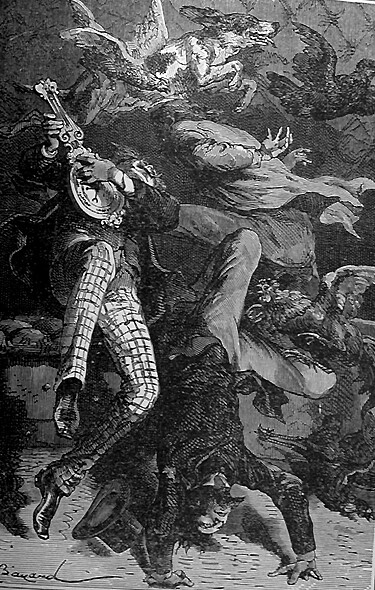
De la Terre à la Lune
Imagination, Science and Discovery
When the astronauts of Apollo One perished in a pre-launch test of their spacecraft, an investigation ensued. One engineer as depicted in the television reenactment of the Apollo program was asked what was to blame for the fire. “Lack of Imagination.” was his response. He explained that engineers had imagined every way the astronauts could be killed in space and designed equipment and procedures to meet every expected danger. It was the danger they never imagined that caught them.
Imagination sent us to the moon long before technology. Jules Verne imagined wartime technology of his day repurposed to send men into space. In 1902 filmmaker Georges Méliès took the new medium of film and added imagination. He created a film journey to the moon using Verne’s giant cannon. John Fitzgerald Kennedy saw the dark weapons of the Twentieth Century and challenged the whole of humanity to literally ‘aim for the moon.’ Here is a modern telling of that wonderful time when science and imagination met to create man’s first voyage away from planet Earth
PART 1 | PART 2 | PART 3 [click to view]
“City of Lights”
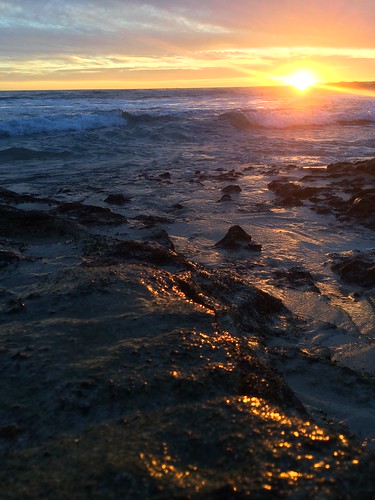
Sunset, Perth, Australia. Photo by S. Kirchman.
On February 20th, 1962, American Astronaut John Glenn orbited the earth. It was the first time an American had done so and the City of Perth, Australia had a warm welcome awaiting him. It was nighttime on that side of the globe and the people of Perth turned on all their lights for Glenn, causing him to proclaim that Perth was the ‘City of Lights!’ Glenn would return to space in 1998 at the age of 77 flying on the space shuttle. Again the lights of Perth were lit for him!
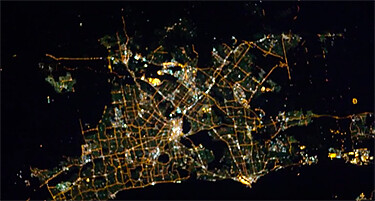
The Lights of Perth. NASA Photo.
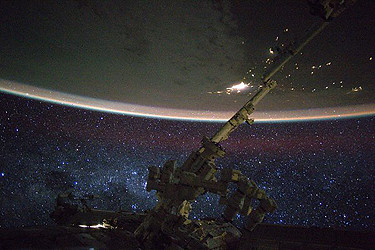
Perth, Australia from the International Space Station. Scott Kelly.
The Eternal City, a Real Place?
[click to read]
Is there really life after death? Or is this life all there is? It's a question that we ignore, we toss aside, and eventually ponder. It's a question that draws out fear and emotional outrage. It's a question that affects how we live and what we live for. Could there really be an eternal city, coming out of heaven, where humanity will live in the next life? I believe that there is just such a place. Our universe is a very interesting place. Have you ever breezed through photos taken by the Hubble telescope? Or looked at photos taken by molecular biologists of cells in the human body? Have you looked up at the stars and the moon and wondered at the harmonious complexity of our world? I know I have done those things.
Have you watched the hummingbird meander effortlessly through the air buzzing at breakneck speeds from flower to flower injecting it's beak into the nectar simultaneously feeding itself and cross-pollinating plants? Have you contemplated the breadth of time from eternity to eternity? Have you considered the factors necessary for the survival of a species? Indeed, these things are spell-binding. They cry out for an intelligence beyond our frame of physical reference with the ability to care for our souls past death. The eternal city is indeed a real place. And there are requirements we must meet to enter that place. These requirements are most certainly moral in nature. After all we as humans think and live in moral terms. We look for justice, mercy, love, forgiveness, and judgment. We know intuitively that abstract ideas, like good and evil, are rooted in fixed reality. We know that good and evil are real. All of these things led to my realization that God is in fact real. And that there is an eternal city beyond our existence on Earth. The very last book of the book tells us about it. It's a book titled "Revelation." Revelation means, "the revealing." It is truly, a fascinating read. (read more)
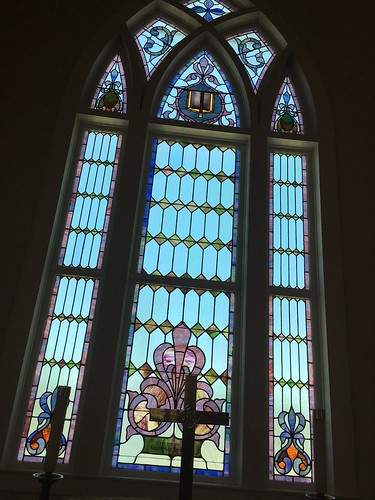
Window, Epworth United Methodist Church, Selma, Virginia.
Photo by Bob Kirchman.
Conservative Case for Environment
Roger Scruton
Why Beauty Matters
Roger Scruton
